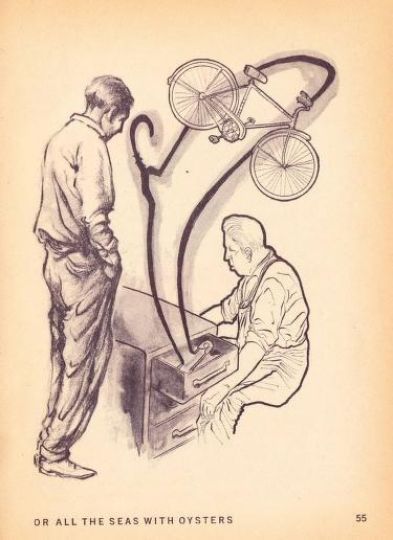Kris
I have now read “Or All The Sea With Oysters” through three times and I keep feeling like I must be missing something.
It seems to be a quite old-fashioned kind of tale of the uncanny set in a bike shop, featuring two rather unpleasant men. If you removed a couple of the 50s touchpoints I wouldn’t have been surprised if you had told me it was an Edwardian tale.
I am scratching my head for more to say on it as it feels to me like a filler piece you would get in a horror collection to get the page count up between the more famous longer works. Or the kind of thing I used to try to write in Secondary school.
When Freud himself nearly half a century before this talks about examples of it a century before that, I struggle to see what made this considered the greatest science fiction, fantasy and horror short story of the year among hundreds of others:
https://web.mit.edu/allanmc/www/freud1.pdf
(To my knowledge nearly 1000 stories across two dozen magazines)
Kit
Oscar seems more terrible than Ferd (I mostly have a vague sense of pity for Ferd), but I was going “Why do I care about these people?” right up until the point where the bicycle regenerated and then I was a little more interested in it. But there’s still not really any sort of plot or even really much to say about it– Ferd was murdered by sapient coat hangers and it’s implied Oscar has taken this whole thing as an opportunity to breed fancy bicycles, but as we didn’t particularly care about either of them before that it doesn’t really leave an impression. How did this even get nominated for a Hugo, let alone win? There’s no story to it, or really anything else. The people are terrible and I don’t care about them and Ferd seems to be jumping to a lot of conclusions– “safety pins grow into coat hangers grow into bicycles” seems like something that doesn’t automatically follow from “bicycles have regenerative powers” even if you accept that “bicycles are a lifeform with their own lifecycle” is a reasonable conclusion for him to be drawing. I understand getting freaked out about the bicycle– though that’s still not super interesting– but jumping right to “the coat hangers and safety pins are in on it!” needs more buildup to make sense. And if the coat hangers take vengeance for almost murdering a bicycle, why are there not more instances of kids getting strangled by coat hangers? Or if it’s because he figured them out, why do they care? Oscar has also figured it out, it’s implied at the end, and they’re leaving him alone, and “died of being strangled by a coat hanger” is a lot more suspicious than “went crazy and started rambling about the sapient bicycles all the time.” The concept doesn’t stand up if you pull the thread at all.
All right, apparently there was more to say than I thought when I sat down to write this.
(After writing the above I went and looked it up in Jo Walton’s An Informal History of the Hugos and she’s like “Great unforgettable classic” and I’m just like “???” I do not understand!)
Mikayla
I do not understand either. This feels about as opposite to “great unforgettable classic” as a story can get to me.
I almost stopped reading this story when it established that one of the two main characters’ entire personality was sexually harassing any woman he came across (including women “barely old enough to be called a woman”), and really that would have been the right decision. More than half of the story doesn’t seem to have any point except to prove how awful Oscar is, while Ferd is just kind of there, and not doing much.
When it finally does get to the science fictional concept, it’s extremely flimsy, and the conclusions that the characters reach come out of nowhere and don’t make any sense. Even if they are right, they are in no way the first explanation that anyone reasonable would come up with, or an explanation that makes sense given the available information. If the story wants me to buy into it, it should have spent any amount of time developing those ideas. I also hated the characters and the story by that point, so I don’t particularly care about anything that’s happening to them.
Rage-quitting this story on page two would have been the better choice. I hate it.

